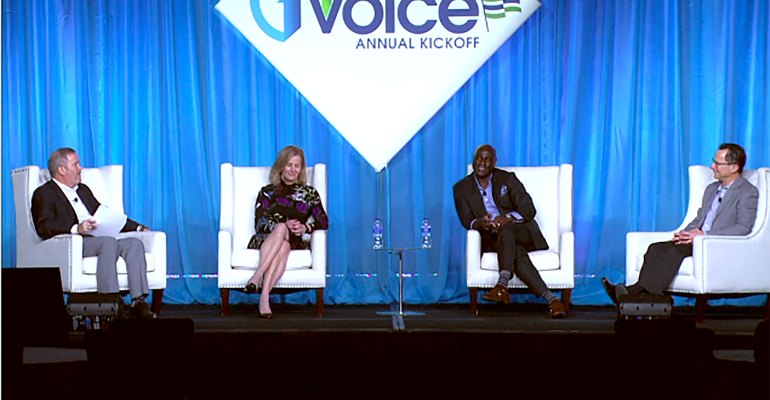Today’s regulatory environment is getting harder for brokers in the independent space, several CEOs of broker/dealer firms argued during a panel discussion at the Financial Services Institute’s annual OneVoice conference in Dallas this week.
In a conversation moderated by FSI President and CEO Dale Brown, Lincoln Investment President and CEO Edward Forst expected the “noose is going to be tightened” in the coming year via enforcement of Regulation Best Interest (Reg BI).
“And I think 2022 is the year they’re going to come after us, because I don’t think there’s a lot of time left in the power that they have in Washington,” Forst said, seeming to allude to Democrats' grip on regulatory agencies through their control of Congress and the White House. “I think they’ll use Reg BI; they don’t have to change the words, they’ll just change the interpretation of it.”
Forst and Brown were joined by Raymond James Financial Services President Jodi Perry and Stifel Independent Advisors President and CEO Alex David, who both agreed that compliance was an increasingly strenuous task under Securities and Exchange Commission Chair Gary Gensler. Additionally, Perry said she was concerned that states were considering their own regulations.
“How many states are going to come forward with privacy rules and their own versions of fiduciary rules and things like that?” she said. “To me, it feels like it can go in a lot of different directions, but it definitely feels like it’s still going in a more difficult direction than we would hope.”
With the inauguration of Joe Biden and the nomination of former Commodity Futures Trading Commission Chair Gensler to serve as head of the SEC, as well as the hiring of several prominent investor protection advocates, the b/d industry potentially faces a decidedly different regulatory regime than in previous years during former Chair Jay Clayton’s tenure.
Prior to the 2020 election and joining Gensler’s office as a senior advisor, former Consumer Federation of America Director of Investor Protection Barbara Roper suggested that it would be better for the SEC to use the “framework” of Reg BI to provide improved investor protection, rather than scrap the rule entirely.
When asked by Brown about the one change they’d make in the regulatory environment, David cited the length of comment periods after new rules were proposed, wanting to see it extended to a 90-to-120-day window, instead of 30 days (SEC Commissioner Hester Peirce has also previously advocated for longer comment periods as the norm).
David also questioned the effectiveness of the “interpretive nature” of the SEC rules. The push and pull of whether the commission’s standards for broker conduct should be “principles-based” or allow for more flexible interpretation—and potentially becoming more prescriptive on the whim of heavy-handed regulators—was a constant point of contention during the debates surrounding Reg BI; in 2018, FSI lauded regulators for sticking to a principles-based standard. David drew an analogy with the Food and Drug Administration, suggesting a scenario where food manufacturers could interpret consumer safety standards for produce.
“It’d be anarchy. But they’re pretty restrictive and tight and concise on ‘this is allowed, this isn’t allowed,’” he said. “I’m not necessarily advocating them to be more prescriptive, (but) perhaps I am. There’s rules-based and then there’s just this wide gap of interpretation, where it’s ‘sorry, you got it wrong.’”
In the discussion, the three CEOs also detailed the tenuous state of the industry’s return-to-office plans, and the myriad ways the Omicron variant had upended plans for a new normalcy. Frost said Lincoln’s employees were back to two days in the office per week and hoped to move to three days per week in office sometime in the first quarter.
At Stifel, David said they’d allowed offices throughout the country to make their own decisions based on local conditions and have brought employees back in office at the St. Louis main hub with some flexibility. Perry said Raymond James split employees into three camps, which included “resident” (defined as in office most of the time), “mobile” (who were in office part of the time) and “remote” (those who worked entirely out of office). Perry said the changes wrought by the move to remote work were a “huge transition,” and while there was no set date yet to return, they were encouraging employees to return to the office at least one day a week.
For Forst, the question of whether someone would be let go if they did not want to return to the office was a “struggle,” even while he believed that overall the firm was much better off being in office.
“I think we’ve done really well processing and increasing productivity while remote, so it’s as good as it can be,” he said. “But solving complicated problems? I’d say we’re doing less well, but I’m not sure I’d lose anybody over something like working in the office versus not working in the office.”

